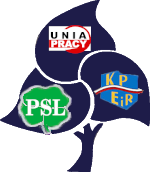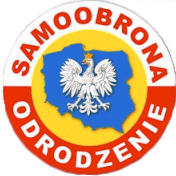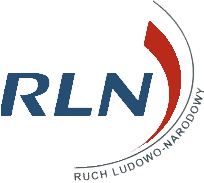Related Research Articles

Andrzej Zbigniew Lepper was a Polish politician, Deputy Prime Minister, Minister of Agriculture, and the leader of Self-Defence of the Republic of Poland. Known for his radical rhetoric and aggressive protests, Lepper was considered a far-left populist, compared to left-wing figures such as José Bové, Hugo Chávez, Evo Morales, and Juan Perón. He left a long-lasting impact on Polish politics, emerging as the "defender of the oppressed and (...) all working people, the weak, and the needy." He was particularly known for his Balcerowicz must go slogan, which he coined to protest the neoliberal Balcerowicz Plan that had deregulated and privatized Polish economy. Lepper considered the capitalist transition "economic genocide".

The Self-Defence of the Republic of Poland is a socialist, populist, agrarian, and nationalist political party and trade union in Poland. The party promotes agrarian socialist and Catholic socialist economic policies combined with a left-wing populist, anti-globalization and anti-neoliberal rhetoric. The party describes itself as left-wing, although it stresses that it belongs to the "patriotic left" and follows Catholic social teaching. The party is sympathetic to Communist Poland, which led political scientists to label the party as neocommunist, post-communist, and far-left.
The Polish Peasant Bloc was a short-lived political party in Poland, founded in 2003 by members of the parliamentary circle of the same name, which was established in December 2002. It was dissolved in 2004, however the parliamentary circle existed until January 2005. It claimed to follow patriotic-peasant-democratic values. The chairman of the grouping was Wojciech Mojzesowicz. In 2014 PBL was reactivated as an informal grouping, and Wacław Klukowski became its president.

League and Self-Defense was a short-lived Polish political alliance between the left-wing populist Self-Defense of the Republic of Poland (Samoobrona) and the national conservative Christian right League of Polish Families (LPR) in July 2007. The alliance was directed against right-wing populist Law and Justice (PiS) that first formed a coalition with both parties, but then gradually marginalized them and shuffled away their ministers. The coalition was marked by mutual distrust as the parties had radically different outlooks, tied together by Euroscepticism, opposition to capitalism and aversion to PiS. The coalition was only polling 6%, and was dissolved by September 2007, shortly before the election. In the 2007 Polish parliamentary election, both LPR and Samoobrona failed to reach the 5% electoral threshold, losing all their 92 Sejm and 10 Senate seats. The downfall of both parties is considered to have been caused by PiS appropriating their political rhetoric.

Patriotic Self-Defence was a minor political party in Poland. The party was founded in September 2006 by former members of the Self-Defence of the Republic of Poland, who left the party following an argument with the leader of Self-Defence Andrzej Lepper. The party ran in the 2007 Polish parliamentary election, where it tried to take votes from their former party by using a similar name, logo and political program. Ultimately, the party's electoral lists were only accepted in one electoral district. The party won 0.02% of the nationwide vote. It disbanded in 2013.

The Party of Regions was a left-wing Polish non-parliamentary political party created in November 2007 and registered in February 2008. The Party of Regions was created by former members of Self-Defence and the Democratic Left Alliance after the parliamentary election in 2007, when Self-Defence support collapsed to far less than the 5% electoral threshold giving them no seats in the new legislature. Founders of the grouping included Krzysztof Filipek, Danuta Hojarska and Bolesław Borysiuk. For failure to disclose their financial records for the year 2015, they were struck off in early 2017.

The Social Alliance was an electoral coalition created for the 1998 Polish local elections. Formed on 27 June 1998, the Social Alliance included the Polish People's Party along with its smaller left-oriented party partners, such as the Labour Union, the National Party of Retirees and Pensioners, the Self-Defence of the Republic of Poland and few members of Alliance of Democrats (Poland). The party represented the "independent left" that challenged the anti-communist and pro-communist dichotomy of Polish politics while maintaining a strongly leftist profile inspired by pre-WW2 socialist and agrarian movements. It protested against the capitalist reforms carried out in Poland such as austerity, criticizing them for creating massive wealth inequality. Nevertheless, the coalition cooperated with the post-communist Democratic Left Alliance as well as the Polish Socialist Party.

The AGROunion is a left-wing agrarian socialist political movement in Poland formed by Michał Kołodziejczak. AGROunia criticizes the actions of current politicians in relation to the state of agriculture in Poland and organizes agricultural protests and information campaigns. The party declares to be built on agrarian socialist ideals and to have taken inspiration from the left-wing nationalist Samoobrona movement, Fighting Solidarity, as well as pre-war agrarian movements such as Polish People's Party "Wyzwolenie". Officially registered in 2022, the party became a socialist party with agrarian and Catholic overtones, with the leader of the party stating in 2022 that "faith, tradition, and Saint Mary herself are all elements of socialism for me". The party denies the labels of populism and nationalism.
The Initiative of the Republic of Poland, often shortened to Initiative RP and IRP, was a short-lived centre-left agrarian and socialist Polish political party. It was founded on 28 May 2004 in Łódź by former activists of Samoobrona RP, mainly from the Łódzkie and Mazowieckie Voivodeships. It existed until 2010.

Self-Defence Rebirth is a Polish political party founded by the former Self-Defence of the Republic of Poland activists. The party was founded by the former lawyer of Andrzej Lepper, Henryk Dzido, who split off from the main Self-Defence party following numerous scandals and the electoral collapse of Samoobrona. Self-Defence Rebirth was also created over concerns that Samoobrona might form a coalition with the right-wing League of Polish Families. Zbigniew Witaszek is one of the key activists of the new party. The party describes itself as Catholic socialist, agrarian socialist, Soft Eurosceptic and left-wing.

Peasants' Party is a Polish political party founded by the former Self-Defence of the Republic of Poland activists in 2018. The party was registered in April 2018 by Krzysztof Filipek, a long-time vice-chairman of Samoobrona, who seceded from Samoobrona for the regionalist Party of Regions in 2007 before founding the Peasants' Party. The party includes former MPs and agrarian activists of Self-Defence such as Danuta Hojarska and Renata Beger. The party announced that it would not run independently in elections, and started cooperating with agrarian trade unions and sought coalitions with left-wing parties. In August 2018, the party entered an agreement with the left-wing Democratic Left Alliance to run on the party's electoral list.

United Beyond Boundaries, known as Action of Disappointed Retirees and Pensioners until 2022 is a Polish political party founded in 2018. The party was created in February 2018 and formally registered six months later, in August 2018. The leader of the party is Wojciech Kornowski, a prominent member and founder of the nationalist communist organisation Patriotic Union "Grunwald". Kornowski was briefly the leader of democratic socialist National Party of Retirees and Pensioners in May 2012, but seceded from the party to create his own pensioner-oriented party Pensioners' Party of the Republic of Poland, which then became the Action of Disappointed Retirees and Pensioners in 2018. Since 2022, the party also leads an electoral committee "United Beyond Divisions".

Edward Gierek's Economic Revival Movement is a Polish left-wing party with a communist programme, referring to the ideology and legacy of Edward Gierek, the First Secretary of the Polish United Workers' Party in the 1970s and 1980s. It was founded on 17 December 2004 and registered in March 2005 by Paweł Bożyk, who was one of Gierek's economic advisors. The largest regional structures of the party are located in Zagłębie and Warsaw. ROG advocates Poland's active participation in the European Union while having friendly relations with the East, and the cessation of activities within NATO. It called for the withdrawal of troops from Iraq.

Self-Defence Social Movement was a political faction within Self-Defence of the Republic of Poland and later an independent political party. Social Movement emerged as a political faction within SRP in early 2000s amongst the local activists of the party in Mazowsze. The faction placed particular emphasis on agrarianism and rural interests. It also fought for social justice and defended people against evictions. In 2006, Social Movement entered into conflict with party leader Andrzej Lepper over the party's electoral lists for the 2006 Polish local elections, which included many newcomers and non-members at expense of long-serving members of the party. The conflict came to a head when the leader of the faction Sławomir Izdebski demanded expulsions of Krzysztof Filipek from the party.

Self-Defence of the Polish Nation, later Defence of the Polish Nation was a minor political party in Poland. The party registered on 15 July 2005 and was a split of 70 members from the left-wing agrarian socialist Self-Defence of the Republic of Poland, though the party already existed as a dissident faction faction within the party since 2003. The party tried to participate in the 2006 Polish local elections and act as a spoiler party against Samoobrona, but the Polish court struck the party off the ballot because of its name and logo being too similar to SRP. In response, the party changed its name to "Defence of the Polish Nation" in October 2006.

People's National Movement was a parliamentary group in the 5th legislature (2005–2007) of Sejm of the Republic of Poland. It was founded on 22 September 2006 by former MPs of Self-Defence of the Republic of Poland and League of Polish Families and was a response to both parties distancing themselves from Law and Justice, which they considered breaking their coalition agreement with. The goal of the People's National Movement was to keep the coalition with Law and Justice at any cost.

The Fatherland – Polish List was an electoral alliance in Poland created by the National Party "Fatherland". It was an electoral bloc that the National Party contested the 1993 Polish parliamentary election with. It unsuccessfully sought an alliance with a far-left agrarian socialist Self-Defence of the Republic of Poland.

The National Party "Fatherland" was a political party in Poland was formed in March 1992 as a result of a split in the National Party (1989). The party leaders were Bogusław Rybicki and Bogusław Jeznach. The newspaper of the party was the weekly magazine "Ojczyzna". National Party "Fatherland" pursued a coalition with left-wing populist and nationalist parties such as the Self-Defence of the Republic of Poland, but was unsuccessful in doing so. The party participated in the 1993 Polish parliamentary election, creating an electoral committee Fatherland - Polish List. However, it failed to win any seats, earning 15.958 votes, which amounted to 0,12% of the popular vote. The party rapidly declined after 1993, and in 1996 it dissolved to join a right-wing National Democratic Party.
The Alternative Social Movement was coalition of Polish political parties formed on 18 March 2001 in Warsaw for the 2001 Polish parliamentary election. The grouping was formed from a merger of Confederation of Independent Poland - Patriotic Camp led by Michał Janiszewski, Tomasz Karwowski, and Janina Kraus, together with a group of politicians originating from the Christian National Union (ZChN), including Henryk Goryszewski and Mariusz Olszewski. The coalition was also joined by the Free Trade Union 'August 80' Confederation, led by Daniel Podrzycki and Bogusław Ziętek. The Alternative Social Movement was registered as a political party, and its members mainly became the activists of August 80.

Social Movement of the Republic of Poland is a Polish political party founded by the agricultural and farmer trade union All-Poland Alliance of Trade Unions of Farmers and Agricultural Organisations, which became known for farmer blockades and protests in winter 2015. It was headed by the leader of OPZZ RiOR Stanisław Izdebski, as well as a known socialist activist Piotr Ikonowicz. The party initially supported Paweł Kukiz, endorsing him in the 2015 Polish presidential election; it then formed and held its first party convention on 26 April 2015. The party was registered on 23 July, and distanced itself from Kukiz. It unsuccessfully attempted to organize a broad left-wing coalition for the 2015 Polish parliamentary election with minor socialist and left-wing parties. After the coalition talks failed, Social Movement ultimately ran independently in the election, but it only managed to gather enough signatures to register its electoral lists in three electoral districts. It won 3941 votes (0.03%) in the 2015 election. After the election, the party's activities were continued by the Social Justice Movement led by Ikonowicz.
References
- 1 2 3 4 5 6 7 8 "Sejm: byli posłowie Samoobrony utworzyli koło Polska Racja Stanu". wp.pl (in Polish). 12 September 2003.
- 1 2 "Numer 255/2004 (2091) z 30 grudnia 2004 r. → Pozycja 13739". imsig.pl (in Polish). 2004.
- 1 2 3 "Numer 17/2006 (2362) z 24 stycznia 2006 r. → Pozycja 938". imsig.pl (in Polish). 2005.
- 1 2 3 4 5 6 7 8 9 "Witaszek objął Rację Stanu". polityka.pl (in Polish). 27 September 2003. Archived from the original on 28 October 2020.
- 1 2 3 4 5 6 7 "Sekrety niezrzeszonych". polityka.pl (in Polish). 29 January 2005. Archived from the original on 30 January 2022.
- 1 2 3 Mateusz Piskorski [in Polish] (2010). Samoobrona RP w polskim systemie partyjnym (in Polish) (Dissertation ed.). Poznań: Adam Mickiewicz University in Poznań. p. 97.
- 1 2 3 4 5 "Polska Racja Stanu po Samoobronie". wp.pl (in Polish). 6 September 2003.
- 1 2 3 "Lepper musi odejść!". wprost.pl (in Polish). 12 March 2006.
- ↑ Gerrit Voerman [in Dutch]; Dirk Strijker; Ida Terluin (2015). "Contemporary Populism, the Agrarian and the Rural in Central Eastern and Western Europe". In Sarah de Lange [in Dutch] (ed.). Rural Protest Groups and Populist Political Parties. Wageningen Academic Publishers. p. 172. doi:10.3920/978-90-8686-807-0. ISBN 9789086862597.
- ↑ Kania-Lundholm, Magdalena (2012). Re-Branding A Nation Online: Discourses on Polish Nationalism and Patriotism. Uppsala University. p. 105. ISBN 978-91-506-2302-4.